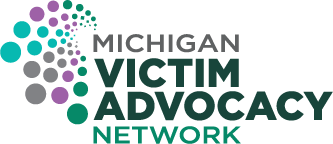While advocating for victims of crime is rewarding and meaningful work, many advocates experience challenges related to job stress and trauma exposure. Working with people who have experienced trauma and injustice can be overwhelming. Over half of all victim advocates experience severe traumatic stress symptoms and high levels of compassion fatigue (et al., 2018; Conrad and Kellar-Guenther, 2006) and 1-in-6 meet the PTSD diagnostic criteria from vicarious exposure to trauma (Bride, 2007). Experiencing these effects does not mean an advocate is weak or has failed, it just means that they need some more resources to help them cope with the difficult nature of the work they do.

Resources for Advocate Resilience
What is vicarious trauma, burnout, compassion fatigue, and secondary traumatic stress?
When advocates work with people who have experienced traumatic events, they are exposed to indirect trauma (I.e. because the advocate didn’t experience the initial trauma themselves) and can experience some of the same effects of the trauma as their clients. Compassion fatigue or secondary traumatic stress or vicarious trauma (terms often used interchangeably) can be accompanied by feelings of fear or sadness, with symptoms that can look almost identical to PTSD but arise from witnessing traumatic stress in others. Vicarious trauma is a risk factor for burnout, which is a process that occurs because of excessive or prolonged levels of job stress, leading to emotional exhaustion, depersonalization, and a reduced sense of personal accomplishment.
The good news is that with proper support, advocates can experience compassion satisfaction and vicarious resilience, which can help mitigate the effects of burnout and compassion fatigue. Compassion satisfaction results in fulfillment from helping others and positive collegial relationships, and vicarious resilience involves the process of learning about overcoming adversity from the trauma survivor and the resulting positive transformation and empowerment through their empathy and interaction. The resources here can help advocates cope with burnout, compassion fatigue, and secondary trauma using individual self-care practices, advocate peer support, and organizational support.
If you’re wondering if what you’re feeling could be the result of vicarious trauma, you can start by asking yourself these four questions (Joyful Heart Foundation) or by completing the Professional Quality of Life Scale:
- Do I bear witness to the suffering of others on a regular basis?
These experiences might include hearing someone tell their story, reading a case file, debriefing with a colleague, or supervising traumatic material. You could also be reporting on these issues for the media, managing social media content for an organization that does work in this field, or answering the phone when crisis calls come in. - Am I in a position where I feel responsible for someone’s safety or well–being?
This could be direct, such as helping a family relocate due to a threat of safety. It can also be indirect, such as being under pressure to raise enough funds to keep crucial programs running or being involved in a prevention campaign. - Do I intuitively know — even if I’m not ready to say it out loud — that my work is starting to impact my health, life or relationships?
This is tricky to identify because the toll of vicarious trauma is slow and cumulative. Our worldview changes over time. Right now, simply ask yourself “have I changed?” If so, the next section on the signs of vicarious trauma may be helpful to you as a next step in understanding your experiences. - Do I work harder than is healthy for my mind and body because the issue feels deeply personal to me?
When a healer has a personal connection to the issue space, it can be natural to feel more invested in the work. If professionals expect to find healing through their work, it can set healers up to re-experience the impact of their own trauma. Healers should keep in mind how their personal perspective may affect those they serve, who each have their own unique healing paths.
